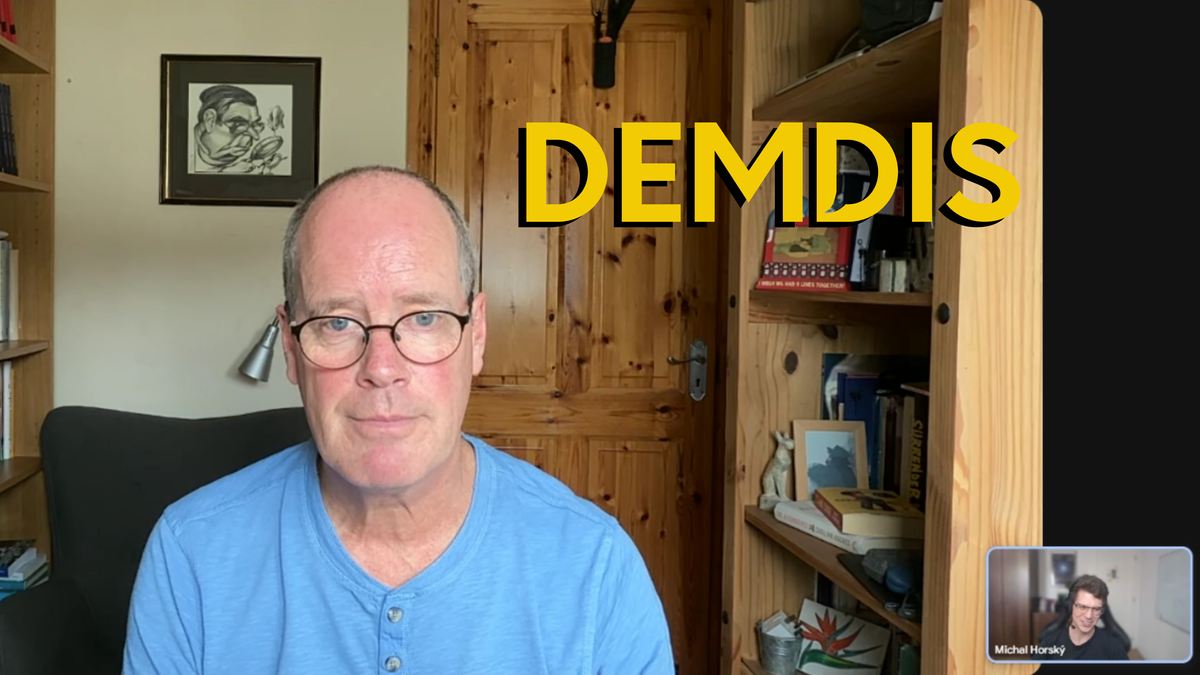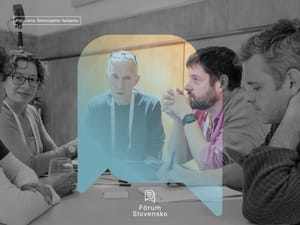Irish political scientist David Farrell has spent the past decade at the forefront of democratic innovation, advising citizens’ assemblies from Dublin to Brussels. In this interview, he reflects on how Ireland’s landmark assemblies emerged from the economic crisis, why involving politicians alongside randomly selected citizens became a “game changer,” and what lessons might inspire similar experiments in other countries, including Slovakia.
Professor Farrell also warns that the Irish model has lost momentum after recent political setbacks, offering candid insights into what can make—or break—public trust in deliberation. Yet, despite the global “polycrisis,” he remains convinced that if democracy is to survive, it must innovate—and citizens’ assemblies could be one of its most powerful tools. Find out more in the interview!
What conditions were needed to take place for Irish citizen’s assemblies to be a success, if you consider it so?
Yeah, I mean, certainly the Irish case has been successful. We might come to later on whether it still is, but it certainly had a good decade of activity in this place. And I suppose, you know, they often say you should never waste a good crisis. So if your country, if your political system is in a moment of crisis, then there's the possibility for something to be experimented with. And that's the Irish story in a nutshell.
We had a major economic crisis during the Great Recession after 2008. It impacted Ireland perhaps more so than almost any other country in Europe. But it was a really serious economic crisis, which then translated into a political crisis because there was a lot of anger from the citizens about how the politicians had let us get into this mess. We had to have a bailout from the IMF and the European Union. And for three or four years, we didn't have control over our own economy. And that crisis was the context in which my colleagues and I started promoting as political scientists the idea of deliberative democracy and citizens assemblies. And we kept talking about the Canadian experience, the world's first citizens assembly in British Columbia at the start of this millennium. And we kept saying, you know, the Canadians did it and why can't we do it?
We kept on being pushed back and being told that we were ignorant, that we didn't understand the reality of politics. And citizens assemblies would never work in Ireland. They might work in Canada, but they wouldn't work in our country. And we have a citizens assembly. It's called our parliament. Why should we create something else? We have our politicians.
The third criticism was, you know, citizens are stupid. It's the job of a professional politician to make these decisions as an elected official. It's not the job of normal citizens to do these things. And these are the three criticisms that are always talked about. Our country is not suitable and we already have our parliament. Our citizens assembly is already a parliament. And we citizens are too stupid. And so we needed help to really get our message across because we're continuously reaching these veto points from the most important players in our system. So we got significant money from a philanthropist to fund an organization which we set up in 2011 called We the Citizens and we ran our own citizens assembly. It was a bottom up thing. So we had a number of forums all around Ireland for a number of months to get an idea of the sort of topics that citizens themselves wanted us to discuss. And then we created our own citizens assembly and then ran this experiment of a citizens assembly that we were running ourselves in which we were able to measure the impact on the members of that citizens assembly of being involved. And this produced a set of social science findings that we then presented to the politicians.
We met with the leaders of every party in Ireland and showed them the results of our research. And the crisis was the context because they were desperate. They had no money to spend on anything because of the economic crash. But they were persuaded by us that, well, they don't have to spend much money to reform your political system. You've got angry citizens outside. Why not embrace the citizens and bring them into the room and let them be at the heart of it? Debate about a future Ireland and it's from that context that Ireland went down this road.
So if we were to narrow it down to some kind of conditions, it could be framed as some external crises that also pose opportunities and on the other hand, grassroots bottom up work with these experimentation models. Do I get it right?
Exactly. I mean, I'd say one more thing if I could, which is there was a sort of circumstance and accident, the accident of the crisis, but there's another accident, which is this: The very first process that the government then established in 2012 was called the Convention on the Constitution. And the government insisted because they didn't fully trust the citizens at this point, they were going in this direction, but not fully. They insisted that a third of the members of this convention should be professional politicians, members of our parliament and we, as the academic said, this is going to be a car crash because the politicians will dominate and they'll be ruined. We were wrong. The government was right because what they then created by this accident in design was a citizens assembly where 2/3 of the members were a random selection of ordinary citizens, but one third were elected citizens, members of the parliament. And they ran this convention following the norms of deliberative procedure. Everyone was treated as an equal. So we had government ministers who were members, and were treated in the same way as somebody who was a housewife, had never been to university. It didn't matter what your background was, everyone was equal. Equal voice, respect of the voice of the other side.
The relevance of this is that to this day in our Parliament, we have senior politicians who had been members of that. So it was the accident of including politicians that really worked. And so my advice to people whenever I'm talking about this elsewhere is if you could get that accident in your system as well, if you could have politicians sitting down with a random selection of citizens and collaborating together in a process of deliberation - you have a good chance that you're going to get a more positive hearing in your parliament later down the road. Because you will have, as we do, members of Parliament saying we need a citizens assembly on this topic. And I know I'm talking from experience because I was a member of one of these things and it's creating those ambassadors in the political class, which I think is a game changer.

So would that also work on a model which is not experimentation, which has the ambition of changing or proposing legislation and then having it implemented or not?
I think it could, and I certainly think the important thing is we shouldn't, none of us should fixate on a concrete model, that citizens assemblies must be like this. You know, these things are evolving all the time. And I think Belgium offers a potentially really interesting variant here. The Brussels Parliament in Belgium has established mixed committees. So the citizens say that this particular topic that is about to go to parliament, they want to be considered by one of these deliberative mixed committees. And then there's a random selection of citizens from Brussels who are brought together with a small group of members of the relevant committee in the parliament. And this super committee then discusses the topic that they've been asked to consider and then that topic goes to the parliament itself and then potentially goes through for further legislation. Now what you're doing with this Brussels example is you're getting politicians to experience this fact of working with normal citizens. And on the whole they seem to like it, but you're also getting the potential of a piece of legislation having a greater chance of being accepted by the Parliament that has been influenced by ordinary citizens in a deliberative process like this.
Interesting. You've mentioned that the first successful cases were in 2012. What is the current state of citizens assemblies in Ireland and what are the main challenges that they face today?
We've had six of these processes since 2012. That was the first and the most recent one was in 2021-2022. It was a citizens assembly that considered drugs control. There are no more planned for now. That doesn't mean we might not have some in the future, but basically what happens is when there's a new government elected in our system. This is the way it has evolved here. And the new government, which is always a coalition of a mix of parties, agrees to a program for the years in which they're going to be in power. And in the last decade, this has usually meant that they have said, okay, we're going to have a citizens assembly, gender equality on drugs, on biodiversity, on climate change. So the government then says we're going to have a citizens assembly on this topic. And then the citizens assembly happens. We've just had an election last year in 2024 and the government that was elected didn't have any citizens assembly referenced in its programme for government. So it seems to have gone off the boil here in Ireland for any number of reasons.
You've had some recent citizen assemblies that led to referendums which were not successful and in one piece you said that “the reputation of Ireland as a trailblazer doesn’t apply any more,” is that true?
You're exactly right. This is one of the reasons why there are no citizens assemblies planned right now. There were two referendums that were run on the same day early last year in 2024, at the details of which we don't need to go into. It would be too boring. But the relevance is that they came from recommendations of a citizens assembly a few years earlier and they were defeated, in one case, defeated by the biggest no vote in the history of all our referendums.
We've had over 40 referendums. This was the worst result that's ever been. And some people blamed the deliberative process saying that it was ‘too woke’. I hate that word, but there were some objections that the citizens really no longer care so much about it and therefore it was going to be rejected. But the reality is that the wording that was set in those two referendums did not reflect the recommendations of the citizens’ assembly. And so in reality, what happened is the government almost blames the citizens assembly. But effectively it sort of says, well, we had the deliberative process, we asked the citizens and it was rejected. But the reality is they didn't really listen to the recommendations of the citizens assembly.
There are all sorts of reasons why it was defeated in these referendums, but I think that certainly was one factor. And then I think that gets to a key issue with using these deliberative processes. It's one thing to set them up and it's one thing to run them properly, but ultimately if they don't succeed in having their recommendations dealt with in a respectful way then it's a failure. And, and what I mean by respectful way is I am not for a moment suggesting that the politicians must implement the recommendations because that's not appropriate.
We're dealing with a representative democracy. We elect our politicians and that's their job, but I think as long as they deal with it respectfully, they don't ignore the recommendations. They don't just simply dismiss them out of hand. I think there's good examples in other countries other than my own where the politicians will engage in a dialogue and say, okay, we're not going to accept this one. We might accept a version of that recommendation, but this one we won't. And these are the reasons why we don't. And I think that then says to people like me that these deliberative processes still have value because they've at least got the politicians to consider the recommendations that have been produced. And that in itself, I think is an achievement if it happens.
My last question would be that from our perspective, and perhaps also from yours, democracies in the world are the most challenged as ever before. We are living in an age of polycrisis. Some may say that the ideas of deliberative democracy are for good weather. What role should they play in the 21st century in your opinion?
I think if democracy is going to survive, it needs to innovate. And I tend to be somebody who remains somewhat, even though this gets harder with every passing day, I remain somewhat optimistic that democracy ultimately survives. But it has to innovate. It can't stand still. There are lots of examples of democracies innovating, reducing the voting age to 18 and bringing in regional assemblies in some countries and gender quotas so more women get elected, introducing Freedom of Information and reforms to campaign finance rules. I could go on. The list is endless. So democracies have always innovated and we forget this, I think sometimes in our pessimism. And I think deliberative processes like citizens assemblies should be part of this piece.
We have growing evidence. Look at the OECD research that talks about the deliberative wave. And it's a truthful description, I think, of what we've seen over the last two decades, that deliberation really has arrived in more and more cases in more and more countries. And it just needs more of us to promote it and more politicians to have the courage to recognize the potential of how they can help representative democracy. I certainly, as I've said already, don't hold to the argument that the job of us is to say representative democracy is going to be replaced by permanent citizens assemblies or something crazy like this. But they can help as a bolt on, as an additional institutional feature if they're run properly. So just help the politicians, hold their hands, encourage them, give them a sense of what citizens, ordinary citizens, think about a particular issue and maybe guide them in taking the right decision to promote change and promote reform themselves.
David Farrell is Professor of Politics at University College Dublin and a member of the Royal Irish Academy and Academia Europaea. A leading specialist in representation, elections, political parties, and deliberative mini-publics, his recent work has advised democratic innovation processes in Ireland, Belgium, the UK, and the Conference on the Future of Europe. He has authored or edited over 20 books, including Electoral Systems: A Global Perspective (2024) and Deliberative Mini-Publics: Core Design Features (2021). His research focuses on harnessing citizen deliberation to strengthen and renew democracy.







